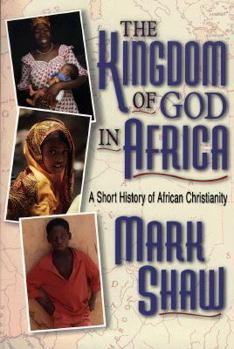The Kingdom of God in Africa: A Short History of African Christianity
This survey of Christianity in Africa looks at the church prior to the emergence of Islam, the medieval centuries of Islamic domination, the missions and colonial eras, and the remarkable story of... This description may be from another edition of this product.
Format:Paperback
Language:English
ISBN:0801020964
ISBN13:9780801020964
Release Date:January 1997
Publisher:Baker Publishing Group (MI)
Length:328 Pages
Weight:1.00 lbs.
Dimensions:0.8" x 7.0" x 9.0"
Age Range:18 years and up
Grade Range:Postsecondary and higher
Customer Reviews
1 rating
Taking on the Kingdom
Published by Thriftbooks.com User , 17 years ago
The Kingdom of God in Africa is engaging and competently written, and appears to have taken into account both specialist and novice. Throughout the work, Shaw presents remarkably clear summaries of people, places, and events. He also does well in working with Niebuhr's kingdom model which was consistently applied throughout. Unfortunately, the very kingdom model that provided the framework for this invigorating study has contributed to its flaws. First is the assumption that one can speak of an "African Christianity." This term suggests that Shaw intends to write about the Christianity "of" Africa, when in reality the multifarious nature of African church history means that one can only write about Christianity "in" Africa. The very fact that North African expressions of Christianity evolved in a very different historical and socio-political climate than Christianity in the South or West mandates different assumptions. Secondly, although Shaw's application of the kingdom model is utilized to avoid the pitfalls of European imperialist or African nationalist subjectivity, his sympathy for the first is subtly manifest. While he does not approach the subject matter with the blatant racism of earlier historians, he does make assumptions that are somewhat exclusive. He compares African syncretism with Christian orthodoxy, but does not critique the concept of who determines "orthodoxy." Isn't it true to say that the Catholic cult of the saints, and even the Christian embrace of Sunday is syncretistic? Further, how can he speak of the European missionary activities in East Africa as a "reintroduction" of Christianity when the Ethiopian Church was very much alive and well? Additionally, in his critique of the "independent" church movements, Shaw contends that for many of the movements, "Jesus Christ... was often obscured by independency." (256) The problem comes with the concept of "independence". Independent from what? A European system that had already obscured Christ with its iconographic imperialism andcolonial intolerance? Thirdly, Shaw's interpretive approach has resulted in an over-reliance on secondary sources. Apart from Augustine's City of God, he does not appear to have consulted primary material. A work such as this should at least have included primary information from the Kebra-Nagast and the Quran. Finally, Shaw has neglected a very important component of Christianity in Africa: the Sabbath. My own research has uncovered that the sanctity of the seventh day in Ethiopian Christianity was not the result of medieval legalism, but a central recognition from the church's inception. In fact, Seventh-day sacredness is a part of the Egyptian Coptic Church's constitution. Shaw also failed to mention that a significant number of the independent churches have rejected Sunday in favor of Sabbath. In sum, Shaw's contribution to the growing body of literature on African Christianity is definitely welcome. The rich legacy of African church history ha






